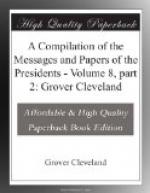In the first year, with 790 appointments, there were 74 removals, or 9.3 per cent; in the second, with 917 appointments, there were 85 removals, or 8.5 per cent; in the third, with 480 appointments, there were 48 removals, or 10 per cent; in the fourth, with 429 appointments, there were 37 removals, or 8.6 per cent. In the four months of President Garfield’s Administration there were 390 appointments and 89 removals, or 22.7 per cent. Precisely the same number of removals (89) has taken place in the fourteen months which have since elapsed, but they constitute only 7.8 per cent of the whole number of appointments (1,118) within that period and less than 2.6 of the entire list of officials (3,459), exclusive of the Army and Navy, which is filled by Presidential appointment.
I declare my approval of such legislation as may be found necessary for supplementing the existing provisions of law in relation to political assessments.
In July last I authorized a public announcement that employees of the Government should regard themselves as at liberty to exercise their pleasure in making or refusing to make political contributions, and that their action in that regard would in no manner affect their official status.
In this announcement I acted upon the view, which I had always maintained and still maintain, that a public officer should be as absolutely free as any other citizen to give or to withhold a contribution for the aid of the political party of his choice. It has, however, been urged, and doubtless not without foundation in fact, that by solicitation of official superiors and by other modes such contributions have at times been obtained from persons whose only motive for giving has been the fear of what might befall them if they refused. It goes without saying that such contributions are not voluntary, and in my judgment their collection should be prohibited by law. A bill which will effectually suppress them will receive my cordial approval.
I hope that, however numerous and urgent may be the demands upon your attention, the interests of this District will not be forgotten.
The denial to its residents of the great right of suffrage in all its relations to national, State, and municipal action imposes upon Congress the duty of affording them the best administration which its wisdom can devise.
The report of the District Commissioners indicates certain measures whose adoption would seem to be very desirable. I instance in particular those which relate to arrears of taxes, to steam railroads, and to assessments of real property.
Among the questions which have been the topic of recent debate in the halls of Congress none are of greater gravity than those relating to the ascertainment of the vote for Presidential electors and the intendment of the Constitution in its provisions for devolving Executive functions upon the Vice-President when the President suffers from inability to discharge the powers and duties of his office.




